| Listing 1 - 10 of 14 | << page >> |
Sort by
|
Book
ISBN: 159756835X 9781597568357 9781597561624 1597561622 Year: 2007 Publisher: San Diego (Cal.) Plural Publishing
Abstract | Keywords | Export | Availability | Bookmark
 Loading...
Loading...Choose an application
- Reference Manager
- EndNote
- RefWorks (Direct export to RefWorks)
As a consequence of the disability movement, the thinking generated by the World Health Organization's classification of disability and functioning, and an upturn in concern for the long-term consequences of aphasia, it has become apparent that two distinctive pathways for the treatment of aphasia have emerged over the past decade. The first (and most traditional) involves assessment and management directed toward lessening the effects of the impairment of aphasia, while the second pathway focuses less on specific language than on the psychosocial consequences of aphasia. This unique text specifically contrasts impairment- and consequences-focused treatment with the aim of providing clinicians with a level playing field that permits them to evaluate for themselves the relative contributions that each approach provides, to evaluate their relative strengths and weaknesses, and finally to seek common ground. An opening chapter sets the scene, while the heart of the book, based on real cases, concerns five meticulously described, yet hypothetical individuals with aphasia. In each of the cases, detailed descriptions and assessment results are provided and clinical management plans, representing each approach, are presented internationally by recognized expert clinicians.
Aphasic persons --- Aphasia --- Aphasiacs --- Aphasics --- People with disabilities --- Rehabilitation --- Patients --- Afasie
Book
ISBN: 9172229357 9789172229358 Year: 1985 Volume: 5 Publisher: Göteborg: Department of Linguistics, University of Göteborg,
Abstract | Keywords | Export | Availability | Bookmark
 Loading...
Loading...Choose an application
- Reference Manager
- EndNote
- RefWorks (Direct export to RefWorks)
Aphasia. --- Nonverbal communication. --- Discourse analysis. --- Aphasic persons --- -Aphasia --- Aphasiacs --- Aphasics --- People with disabilities --- Language --- Patients --- Language. --- -Language --- Aphasia
Book
ISBN: 9789004253131 9004253130 9781848552180 1848552181 Year: 2011 Publisher: Bingley [England]
Abstract | Keywords | Export | Availability | Bookmark
 Loading...
Loading...Choose an application
- Reference Manager
- EndNote
- RefWorks (Direct export to RefWorks)
Augmentative and Alternative Communication for Adults with Aphasia is a text written for practising clinicians, undergraduate and graduate students, assistive technologists and other stakeholders who are interested in learning more about the communication needs and options for people with aphasia. Although there are several book chapters dedicated to aphasia in currently available textbooks in augmentative and alternative communication (AAC), this is the first book dedicated entirely to AAC and aphasia. The book aims to: Provide an overview of aphasia and various treatment approaches. Provide a comprehensive review of AAC intervention approaches for persons with aphasia. Evaluate the efficacy of AAC intervention approaches that use technology, such as speech generating devices, and non-technological AAC approaches as part of a treatment package. Examine the ways in which techniques and strategies can be applied to persons with aphasia. Better understand how both direct stakeholders (i.e., persons with aphasia) as well as indirect stakeholders (e.g., close and extended family members, friends, paid caregivers) feel about the effectiveness of AAC intervention in persons with aphasia.
Aphasic persons. --- People with disabilities --- Augmentative and alternative communication --- Communication --- Aphasia --- Aphasiacs --- Aphasics --- Means of communication. --- Patients
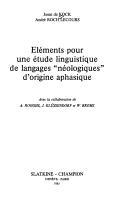
ISBN: 2051006652 9782051006651 Year: 1985 Volume: 32 Publisher: Genève: Slatkine,
Abstract | Keywords | Export | Availability | Bookmark
 Loading...
Loading...Choose an application
- Reference Manager
- EndNote
- RefWorks (Direct export to RefWorks)
French language --- Psycholinguistics --- Neuropathology --- Psychiatry --- Phonetics --- Aphasic persons --- Language --- -Academic collection --- Aphasia --- Aphasiacs --- Aphasics --- People with disabilities --- Patients --- Academic collection --- Aphasie --- Afasie. --- Aphasic persons - Language
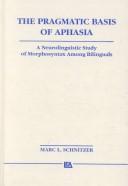
ISBN: 0805801901 Year: 1989 Publisher: Hillsdale, N.J. Erlbaum
Abstract | Keywords | Export | Availability | Bookmark
 Loading...
Loading...Choose an application
- Reference Manager
- EndNote
- RefWorks (Direct export to RefWorks)
Aphasic persons --- -Aphasia --- Aphasiacs --- Aphasics --- People with disabilities --- Language --- Patients --- Bilingualism. --- Child development. --- Developmental psychology. --- Life cycle, Human. --- Neurolinguistics. --- Aphasia. --- Neuropsychology. --- Psycholinguistics. --- Language. --- -Language --- Psycholinguistics --- Neuropathology --- Grammar
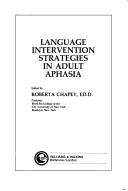
ISBN: 0683015117 9780683015119 Year: 1982 Publisher: Baltimore Williams and Wilkins
Abstract | Keywords | Export | Availability | Bookmark
 Loading...
Loading...Choose an application
- Reference Manager
- EndNote
- RefWorks (Direct export to RefWorks)
Aphasic persons --- -Language disorders --- #KVHB:Afasie --- Dysphasia --- Communicative disorders --- Aphasia --- Aphasiacs --- Aphasics --- People with disabilities --- Rehabilitation --- Patients --- Language therapy --- Language disorders --- Rehabilitation. --- Therapy. --- Methods. --- Aphasic persons - Rehabilitation
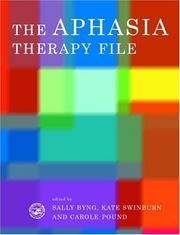
ISBN: 1135471681 1280402369 9786610402366 0203193555 9780203193556 9780863775666 0863775667 0203226364 9780203226360 9781135471682 9781135471637 1135471630 9781135471675 1135471673 9780863775673 0863775675 0863775667 9781841692708 9780203490839 9781135426538 9781135426484 9781135426521 9781138006058 Year: 2007 Publisher: Hove Psychology Press
Abstract | Keywords | Export | Availability | Bookmark
 Loading...
Loading...Choose an application
- Reference Manager
- EndNote
- RefWorks (Direct export to RefWorks)
Different from a textbook or academic journal, the File represents a collection of explicit descriptions about therapy interventions written by practitioners themselves. The description of the rationale for the therapy, the intervention itself and evaluation of outcomes are of paramount importance. Each contributor guides the reader through the thinking that they engaged in as they decided what to do, often with considerable frankness about the difficulties involved. The File will be of equal value to experienced practitioners and students alike.
Aphasia --- Aphasic persons --- Speech therapy --- Aphasiacs --- Aphasics --- People with disabilities --- Brain --- Language disorders --- Speech disorders --- Treatment --- Rehabilitation --- Patients --- Diseases --- #KVHB:Afasie --- Afasie --- Therapie --- Orthopedagogics --- spraaktechnologie --- spraakstoornissen --- afasie --- spreken
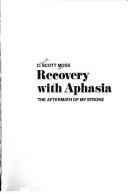
ISBN: 0252002717 Year: 1972 Publisher: Urbana, Ill. University of Illinois Press
Abstract | Keywords | Export | Availability | Bookmark
 Loading...
Loading...Choose an application
- Reference Manager
- EndNote
- RefWorks (Direct export to RefWorks)
Psycholinguistics --- Neuropathology --- Aphasic persons --- -Aphasic persons --- -#PEDA *6.541 --- Aphasia --- Aphasiacs --- Aphasics --- People with disabilities --- Biography --- Rehabilitation --- Patients --- Moss, Claude Scott --- #PEDA *6.541 --- Moss, Claude Scott, --- Moss, C. Scott
Book
ISBN: 9026502281 9789026502286 Year: 1976 Volume: 4 Publisher: Amsterdan: Swets & Zeitlinger,
Abstract | Keywords | Export | Availability | Bookmark
 Loading...
Loading...Choose an application
- Reference Manager
- EndNote
- RefWorks (Direct export to RefWorks)
Neuropathology --- Aphasia --- Aphasic persons --- Aphasie --- Aphasiques --- Rehabilitation --- Congresses --- Rééducation --- Congrès --- Congresses. --- rehabilitation --- -#KVHB:Afasie --- #KVHB:Neurolinguistiek --- Aphasiacs --- Aphasics --- People with disabilities --- -Congresses --- Patients --- Rééducation --- Congrès --- #KVHB:Afasie --- Rehabilitation&delete& --- Aphasic persons - Rehabilitation - Congresses. --- Aphasia - rehabilitation - congresses
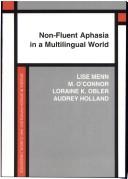
ISBN: 9027243352 1556193912 9786613424341 9027276366 1283424347 9789027243355 Year: 1995 Volume: 5 Publisher: Amsterdam: Benjamins,
Abstract | Keywords | Export | Availability | Bookmark
 Loading...
Loading...Choose an application
- Reference Manager
- EndNote
- RefWorks (Direct export to RefWorks)
"Non-fluent Aphasia in a Multilingual World" is an up-to-date introduction to the language of patients with non-fluent aphasia. Recent research in languages other than English has challenged our old descriptions of aphasia syndromes: while their patterns can be recognized across languages, the structure of each language has a profound effect on the symptoms of aphasic speech. However, the basic linguistic concepts needed to understand these effects in languages other than English have rarely been part of the training of the clinician."Non-fluent Aphasia in a Multilingual World" introduce
Bilingualism --- Agrammatism --- Aphasic persons --- Language --- Psycholinguistics --- Agrammatism. --- Bilingualism. --- Aphasia --- Aphasiacs --- Aphasics --- People with disabilities --- Language and languages --- Languages in contact --- Multilingualism --- Agrammatic aphasia --- Agrammatologia --- Grammatical speech disorders --- Speech disorders, Grammatical --- Grammaticality (Linguistics) --- Language. --- Patients --- Aphasic persons - Language
| Listing 1 - 10 of 14 | << page >> |
Sort by
|

 Search
Search Feedback
Feedback About UniCat
About UniCat  Help
Help News
News